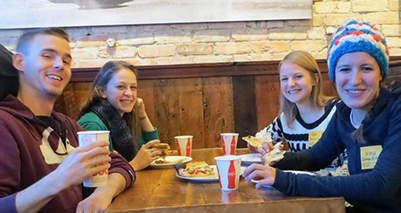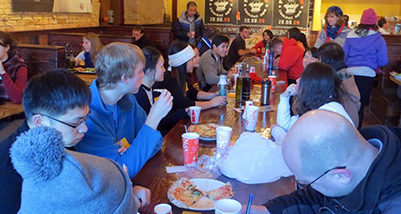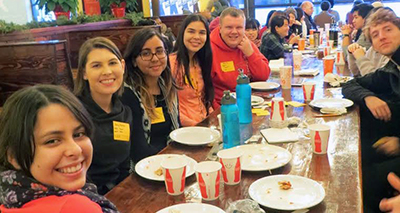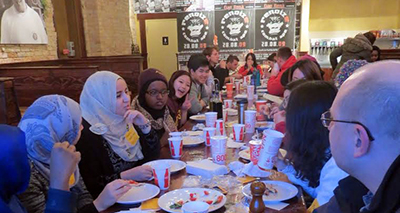The PACE Project is sponsoring a four-day ACTFL OPI Tester Training workshop for up to ten language instructors May 18-21, 2015. The workshop will take place in Jones Hall and will be conducted by an expert ACTFL OPI Tester trainer.
This four-day workshop introduces the ACTFL rating scale, the structure of the Oral Proficiency Interview (OPI), and techniques of administering and rating the OPI. Participants observe and conduct live practice interviews across all proficiency levels (Novice through Superior). Participants will critique and discuss interview elicitation, structure, and rating. Participation in this workshop can be the first step towards certification as an ACTFL OPI Tester for those who choose to do so. We hope that participation in this workshop will lead to a greater focus on proficiency and to greater opportunities for student success in developing their proficiency.
The workshop is funded by the PACE Project, which covers the cost of the training plus breakfast and lunch.
If you would like to apply for this opportunity, please register your interest through this form by January 5, 2015. Priority will be given to instructors of PACE languages funded by the grant.
The PACE Project is funded by a grant from The Language Flagship.
Tuesday, December 30, 2014
Monday, December 15, 2014
ACTFL OPI Assessment Workshop: May 18-21, 2015
The PACE Project is sponsoring a four-day ACTFL OPI Tester Training workshop for up to ten language instructors May 18-21, 2015. The workshop will take place in Jones Hall and will be conducted by an expert ACTFL OPI Tester trainer.
This four-day workshop introduces the ACTFL rating scale, the structure of the Oral Proficiency Interview (OPI), and techniques of administering and rating the OPI. Participants observe and conduct live practice interviews across all proficiency levels (Novice through Superior). Participants will critique and discuss interview elicitation, structure, and rating. Participation in this workshop can be the first step towards certification as an ACTFL OPI Tester for those who choose to do so. We hope that participation in this workshop will lead to a greater focus on proficiency and to greater opportunities for student success in developing their proficiency.
The workshop is funded by the PACE Project, which covers the cost of the training plus breakfast and lunch.
If you would like to apply for this opportunity, please register your interest through this form by January 5, 2015. Priority will be given to the PACE languages funded by the grant.
The PACE Project is funded by a grant from The Language Flagship.
This four-day workshop introduces the ACTFL rating scale, the structure of the Oral Proficiency Interview (OPI), and techniques of administering and rating the OPI. Participants observe and conduct live practice interviews across all proficiency levels (Novice through Superior). Participants will critique and discuss interview elicitation, structure, and rating. Participation in this workshop can be the first step towards certification as an ACTFL OPI Tester for those who choose to do so. We hope that participation in this workshop will lead to a greater focus on proficiency and to greater opportunities for student success in developing their proficiency.
The workshop is funded by the PACE Project, which covers the cost of the training plus breakfast and lunch.
If you would like to apply for this opportunity, please register your interest through this form by January 5, 2015. Priority will be given to the PACE languages funded by the grant.
The PACE Project is funded by a grant from The Language Flagship.
Thursday, December 11, 2014
Indonesian Through a Screen: Jack Kreiser's CourseShare Experience
This semester, the University of Minnesota has partnered with several Big 10 institutions to provide less-commonly-taught language courses through teleconferencing and other digital means, a project funded by the Consortium for Institutional Collaboration (CIC) CourseShare program. When Junior Jack Kreiser learned about CourseShare, he eagerly got in contact about the possibility of an Indonesian course.
"I've always been interested in languages and geography in general, and Indonesia has always been a sort of favorite of mine," he said.
Thanks to CourseShare, Kreiser was able to enroll in an Indonesian course offered through the University of Wisconsin-Madison. He is the only U of M student enrolled in this particular CourseShare class. The rest of his class and his instructor only know him from what they've seen of him on their computer screen.
"Before the program started, I was worried about how my classmates would feel about having a stranger in their class studying over videoconference," he remembered. "The students in the class had already had a year of Indonesian class together, and I worried I might be seen as intruding on their class."
Kresier was relieved to find that "all my classmates are very nice and have accepted me into the class." They've made him feel included and welcomed, he said, and they all enjoy joking around with each other--although some of their favorite jokes aren't ones that can be found in a typical classroom.
"For one class activity, we had to line up based on height, age, etc. Because I wasn't physically in the room, the class TA had to stand in my place. My classmates and I also like to tease each other by asking the other if they want some of our food when someone brings snacks to class."
After several weeks of observing the CourseShare classes, Program Coordinator Pablo Viedma is excited to see everything going so well.
"The students seem to be having a lot of fun; they're always laughing and having a good time," he said.
As is the case with most big projects, obstacles presented themselves early on in the semester. Viedma says the staff had to work quickly to correct some technological issues, primarily improving the sound. Since then, there have been no major issues, but Viedma is prepared to confront them should they appear."We're learning as we go," he said, "and now it will be nice to be able to anticipate these problems with future courses."
Kreiser is looking forward to continuing his Indonesian course next semester and encourages others to take advantage of CourseShare as well.
"I would really like for the CourseShare program to make itself more well-known on campus. The actual program itself is run very well, it's just that very few people know about it," he said.
He especially encourages those who are interested in less-commonly-taught languages, such as Indonesian, to find out more information about this program and enroll in a course.
If you are interested in CIC CourseShare and would like more information, please contact CourseShare Coordinator Pablo Viedma by emailing viedma@umn.edu.
"Studying a less-commonly-taught language makes you stand out and differentiate yourself from others. [It] also provides great academic and career options. There are many scholarship programs for a large number of less-commonly-taught languages due to an insufficient number of speakers in these languages. Employers also are interested in speakers of less commonly taught languages because it is very difficult to find employees that can speak these language to meet their language needs.
"Studying a less-commonly-taught language is [also] really cool because people will want to talk to you about the language you are studying. Nobody would be asking me questions right now about the language I study if I had chosen a commonly-taught language."I've really enjoyed knowing that I am the only person in the entire university that is taking a class in Indonesian. [...] Indonesia is home to a quarter billion people, but most Americans don't know or hear very much about this giant country. When I tell people I am studying Indonesian, the two most common responses are: 'That's a language?' and 'Where's Indonesia?' This strange lack of interest in Indonesia in our society has draw me to learn more about the country and its people because I believe that our society should be more aware of other places and cultures around the world."
PACE Swap Shop: Turnin' Up the Heat with In-Class Activities
On December 1, 2014, the PACE Professional Development (PD) Peer Team held a second Swap Shop event. Swap Shops are short, informal opportunities for language instructors from all departments to share activities and learn from one another. The most recent event included instructors from Arabic, Chinese, French, German, Italian, Japanese, Korean, Portuguese, and Spanish.
The event began with Rasha El Helw, instructor of Beginning and Intermediate Arabic, presenting the curricular idea of a "Gallery Walk." In a gallery walk, instructors set up different stations around the room with discussion prompts which students explore and and respond to as they alternate between stations. This can serve as a good tool for for prompting discussion about readings, movies, or other class materials, while allowing students to remain active physically.
Next Minori Inada, instructor of Beginning Japanese, and Ayumi Mita, instructor of Beginning and Intermediate Japanese, presented their newly created Integrated Performance Assessment (IPA). IPAs are a type of assessment which gives students the opportunity to show their ability to use language skills in real-life situations. As a part of this IPA, students were asked to identify key pieces of information from Japanese event posters, discuss the event with a partner, and propose alternatives to attending that specific event. This allowed students to put their knowledge of Japanese vocabulary and grammar into practice and accurately showcase their understanding of the language.
Participants discussed these practices and how they could be further developed and applied. Thanks to those who were able to attend and collaborate! Stay tuned for more information about Swap Shops in Spring 2015!
The PACE Project is funded by a grant from The Language Flagship.
The event began with Rasha El Helw, instructor of Beginning and Intermediate Arabic, presenting the curricular idea of a "Gallery Walk." In a gallery walk, instructors set up different stations around the room with discussion prompts which students explore and and respond to as they alternate between stations. This can serve as a good tool for for prompting discussion about readings, movies, or other class materials, while allowing students to remain active physically.
Next Minori Inada, instructor of Beginning Japanese, and Ayumi Mita, instructor of Beginning and Intermediate Japanese, presented their newly created Integrated Performance Assessment (IPA). IPAs are a type of assessment which gives students the opportunity to show their ability to use language skills in real-life situations. As a part of this IPA, students were asked to identify key pieces of information from Japanese event posters, discuss the event with a partner, and propose alternatives to attending that specific event. This allowed students to put their knowledge of Japanese vocabulary and grammar into practice and accurately showcase their understanding of the language.
Participants discussed these practices and how they could be further developed and applied. Thanks to those who were able to attend and collaborate! Stay tuned for more information about Swap Shops in Spring 2015!
The PACE Project is funded by a grant from The Language Flagship.
TandemPlus Punch Pizza Party
TandemPlus had its third and final get-together of the semester on Wednesday, December 3rd at Punch Pizza in Stadium Village. This event was extra special thanks to generous funding from an Innovative Community Building Grant from ISSS, which allowed Tandem to buy lots of pizza and pop (or "soda" if you're not from Minnesota) for the more than 50 participants who came with their partners or solo to chow down on Neapolitan style pizza and escape the frigid winter. It was a rare and wonderful thing to have speakers and learners of English, Spanish, German, Portuguese, Russian, Japanese, Arabic, Chinese, Korean, and French gathered together sharing pizza and conversing in multiple languages, and a great time was had by all.




TandemPlus will open registration for Spring Semester in late January. Have a great Winter Break!




TandemPlus will open registration for Spring Semester in late January. Have a great Winter Break!
Monday, December 8, 2014
CIC Courseshare: History Class Taught in Finnish Spring 2015
FIN 3670 Suomen Historia / History of Finland
How have Finnish society and culture developed over the course of Finland's history? How does history impact the present and how is it used in the politics of today? This course will cover the history of Finland from the earliest times up to the present, focusing especially on the last 200 years. In addition to the history of great events and statesmen, we will discuss history from other perspectives, including those of ordinary people, women, and minorities. In our discussions we will contemplate history's significance on the present and we will compare Finland's history to that of other countries. In addition to teaching history, the goal of the course is to improve students' reading and listening abilities in Finnish, as well as their discussion skills.
This course, taught entirely in Finnish, is geared toward students who have completed at least five semesters of college Finnish or who otherwise have at minimum an advanced command of the language. The course will be taught on campus and will be sent via CIC Courshare to the University of Wisconsin-Madison. Please contact Matti Jutila or Daniel Karvonen with questions.
How have Finnish society and culture developed over the course of Finland's history? How does history impact the present and how is it used in the politics of today? This course will cover the history of Finland from the earliest times up to the present, focusing especially on the last 200 years. In addition to the history of great events and statesmen, we will discuss history from other perspectives, including those of ordinary people, women, and minorities. In our discussions we will contemplate history's significance on the present and we will compare Finland's history to that of other countries. In addition to teaching history, the goal of the course is to improve students' reading and listening abilities in Finnish, as well as their discussion skills.
This course, taught entirely in Finnish, is geared toward students who have completed at least five semesters of college Finnish or who otherwise have at minimum an advanced command of the language. The course will be taught on campus and will be sent via CIC Courshare to the University of Wisconsin-Madison. Please contact Matti Jutila or Daniel Karvonen with questions.
2015 Central States Conference on the Teaching of Foreign Languages: Funding Request Application
The Language Center has funds available to cover the early bird registration fee ($140; $85 for full time students; $80 for Saturday only attendance) of up to 30 P&As and graduate instructors from CLA language departments to attend the Central States Conference on the Teaching of Foreign Languages (CSCTFL).
The theme for 2015 is "Learn Languages, Explore Cultures, Transform Lives." It will be held at the Hilton in downtown Minneapolis March 12-14, 2015.
CSCTFL is an annual conference that holds more than 200 sessions for world language teachers at all levels of instruction. Topics stretch from generating excitement over language learning to exploring the use of technology. More information about the conference can be viewed at http://www.csctfl.org/. The conference was last held in Minneapolis in 2010.
Funding will be given to those who have not previously attended a CSCTFL conference. If you would like to apply for this opportunity, please register your interest by January 5, 2015.
The theme for 2015 is "Learn Languages, Explore Cultures, Transform Lives." It will be held at the Hilton in downtown Minneapolis March 12-14, 2015.
CSCTFL is an annual conference that holds more than 200 sessions for world language teachers at all levels of instruction. Topics stretch from generating excitement over language learning to exploring the use of technology. More information about the conference can be viewed at http://www.csctfl.org/. The conference was last held in Minneapolis in 2010.
Funding will be given to those who have not previously attended a CSCTFL conference. If you would like to apply for this opportunity, please register your interest by January 5, 2015.
Subscribe to:
Comments (Atom)
© Regents of the University of Minnesota. All rights reserved. Equal opportunity educator and employer.
